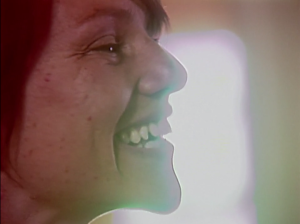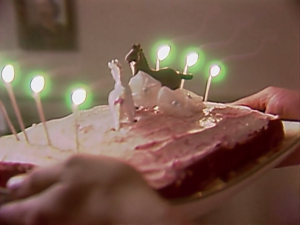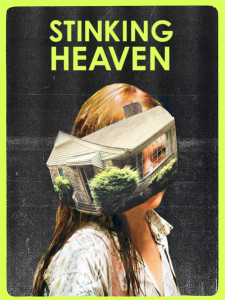 Review: Wisconsin Film Festival
Review: Wisconsin Film Festival
Stinking Heaven | Nathan Silver | USA | 2015 | 70 min
Wisconsin Film Festival, UW Cinematheque (4070 Vilas Hall), Friday, April 10, 9:00pm»
Stinking Heaven is another strong outing from Nathan Silver, whose combination of visual style and improvisational storytelling set him apart as an increasingly distinctive voice in American independent cinema.
During the Q&A after the screening of Sabbatical at last year’s Wisconsin Film Festival, director Brandon Colvin remarked upon the suitability of 1.33:1—the “Academy” aspect ratio—to the human body, and particularly the face. I bring this up for two reasons: 1) the comment stuck with me throughout director Nathan Silver’s Stinking Heaven, being proof positive of this notion, and 2) I first discovered Silver thanks to Colvin’s Micro-Wave Cinema Series.
Stinking Heaven takes place in Passaic, New Jersey, in 1990, and is ostensibly about the slow breakup of a commune devoted to sober living. It is also an exceptional experiment in cinematography, opting to use 1970’s broadcast television cameras to tell the story. In its way, this is quite fitting, seeing as how Passaic is sometimes referred to as the birthplace of television.
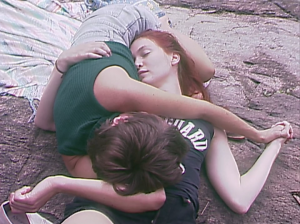 Because the film begins with a short, intimate scene depicting two of the main characters, Betty and Ann (Eleonore Hendricks and Hannah Gross), we expect the story to focus on them. The film then cuts to a scene of Betty getting married to Kevin (Henri Douvry), one of the members of the commune, in a ceremony presided over by the commune’s leader, Jim (Keith Poulson of Listen Up Philip). Only when Ann shows up at the commune later do we understand that the opening took place in the past. We may again expect the film to refocus on Betty and Ann, but it pleasantly surprises by foiling those expectations. The film has a much wider emotional canvas, despite its 70-minute run time. Contemporary Hollywood has instilled in us a notion that if we have a substantial time shift—particularly anything resembling a flashback—in the first portion of the picture, we must somehow work our way back to where we began. And here we have one of the things I love about Nathan Silver’s films: they opt out of this increasing narrative trend. What you see is what you get; this film only ever moves forward.
Because the film begins with a short, intimate scene depicting two of the main characters, Betty and Ann (Eleonore Hendricks and Hannah Gross), we expect the story to focus on them. The film then cuts to a scene of Betty getting married to Kevin (Henri Douvry), one of the members of the commune, in a ceremony presided over by the commune’s leader, Jim (Keith Poulson of Listen Up Philip). Only when Ann shows up at the commune later do we understand that the opening took place in the past. We may again expect the film to refocus on Betty and Ann, but it pleasantly surprises by foiling those expectations. The film has a much wider emotional canvas, despite its 70-minute run time. Contemporary Hollywood has instilled in us a notion that if we have a substantial time shift—particularly anything resembling a flashback—in the first portion of the picture, we must somehow work our way back to where we began. And here we have one of the things I love about Nathan Silver’s films: they opt out of this increasing narrative trend. What you see is what you get; this film only ever moves forward.
 As with his previous films, Silver’s actors deliver great performances that are well lived in, thanks to his direction and the cast’s talent and outstanding improvisational skills. Silver shapes cacophonous dialogue scenes in ways reminiscent of Altman, and he handles silence just as deftly. When combined with the 1.33 aspect ratio, his sensibilities convey interiority effortlessly and, in the case of this story, the claustrophobia that can arise from so many people living in such a physically and emotionally tight space. There is a scene where one of the residents claws her way through a VHS tape, ripping it apart. It only takes a few seconds, but it’s one of the most visceral moments of filmmaking I’ve seen in some time.
As with his previous films, Silver’s actors deliver great performances that are well lived in, thanks to his direction and the cast’s talent and outstanding improvisational skills. Silver shapes cacophonous dialogue scenes in ways reminiscent of Altman, and he handles silence just as deftly. When combined with the 1.33 aspect ratio, his sensibilities convey interiority effortlessly and, in the case of this story, the claustrophobia that can arise from so many people living in such a physically and emotionally tight space. There is a scene where one of the residents claws her way through a VHS tape, ripping it apart. It only takes a few seconds, but it’s one of the most visceral moments of filmmaking I’ve seen in some time.
I found the film’s style to be the star every bit as much as its cast, especially the cinematography by Adam Ginsberg. In concert with natural light, the choice to shoot with the broadcasting camera gives Stinking Heaven a quality I can only describe as ethereal grit. I was particularly keen on the way the light played off the actors in profile shots, or the bizarre green halos that would appear around certain light sources (like the candles on a wedding cake) or, indeed, the actors themselves. There are moments later in the film when its slow zooms, paired with a synth score, make the film reminiscent of certain moments in Kubrick’s later work, as the commune’s residents’ collective emotional state slowly gives way to manic turmoil.
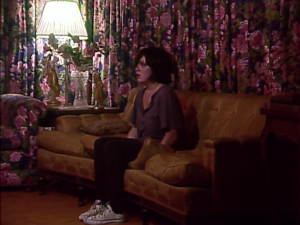 I’ve seen this film referred to as a black comedy. While there are certainly funny moments, it didn’t connect with me as a comedy per se. In fact, I found it at times to be a pretty intense experience, and despite my familiarity with Silver’s work, it took me some time to get acclimated to this movie, most of which plays for me more on the serious end of the spectrum. That said, reactions might be different in a crowded theater.
I’ve seen this film referred to as a black comedy. While there are certainly funny moments, it didn’t connect with me as a comedy per se. In fact, I found it at times to be a pretty intense experience, and despite my familiarity with Silver’s work, it took me some time to get acclimated to this movie, most of which plays for me more on the serious end of the spectrum. That said, reactions might be different in a crowded theater.
In addition to the film itself, another draw will be Silver’s appearance at the screening, along with producer Rachel Wolther. Having interacted with Silver at a Q&A session at an earlier Micro-Wave screening, I can assure you that you’ll want to stick around for this one too. He is both articulate and open about his shooting process, and I felt that I learned quite a bit from him in a relatively short time. The screening will be preceded by the short film Bad at Dancing, directed by Joanna Arnow and also produced by Rachel Wolther.
I won’t pretend that Stinking Heaven is a film for everyone. It’s not, and while it paints an amazingly realized portrait of these characters in a short space of time, it may take a lot out of you. But if you are in touch with what Silver is doing here, and you are open to a less conventional style of storytelling, you will find yourself rewarded by a film from one of the most original voices in American independent cinema today.
